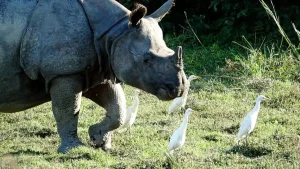Within the last few weeks, I would bet my last Gu gel that someone has asked you, “Do you watch Severance?” And if you said no or blinked back in confusion, I’m sure I’m not the first one to tell you that it’s incredible.
For the un-aquainted, Severance, which first aired in 2022, is set in a futuristic era where a company called Lumon Industries has developed the biotechnology that allows its employees to ‘sever’ their brains into two personalities: your working self and your personal self. Severed people undergo a medical procedure that implants a device in their brain, which causes employees to forget everything about the outside world once they step foot into their work building. Likewise, once they leave, all the memories of what happened during the workday or gone. So in theory, there are “two” versions of yourself, one who works, and one who doesn’t.
After years of anticipation, season two episode one premiered on January 17. And in truth, it’s all I’ve been thinking about lately.
The brilliance of the show is that it touches on themes of work-life balance, workplace culture, political expression, and the meaning of memory and community. It makes you think about what life would be like if you had the option to be severed. You’d never have to feel the stress or exhaustion of work ever again, and focus solely on your personal life. On the other hand, you technically create this whole other “you” that knows nothing about yourself or the outside world—just the four walls of your cubicle. As I watch season two as a new episode is released week by week, I start to wonder how being severed would apply to other areas of my life—like running.
RELATED: Meet the Hip-Hop Celebrity Stylist Who Dresses the World’s Fastest Men
Would You Sever Your Running Self?
What if, as soon as I slipped on my running shoes, my severed self stepped in and took on all the grunt work? Say one day I’m not looking forward to a tough workout in the cold. If I had a severed running side, I wouldn’t have to feel the bitter chill, climb tortuous hill repeats, or endure huffing through race pace miles. I’d step outside in my shoes, and in the blink of an eye, be done and back inside for a post-run snack. I’d reap the rewards of building my endurance and athleticism for fun races and routes without needing to suffer through the not-so-fun parts of a training block.
The fictional scenario sounds tempting. “But running is supposed to be fun!” You might say. “If you don’t love it, don’t do it!” Yeah, yeah, yeah. I agree. But if you’ve ever trained for a race, you know there are days when you wish you’d picked an easier hobby. Here are some instances in which I wish I was severed:
- When my alarm goes off at 5 A.M. for my early run and I’m snuggled in bed, sleeping on the cool side of the pillow.
- When I’m running through pouring-down rain so heavy I’m open-mouth breathing like a carp.
- When I have to run up a hill that forces me into near slow-motion pace.
- When I run out of water during a blistering hot run.
- When the run is so sticky and muggy that I have to peel off the gnats that got stuck to my face one by one.

Turns out the reason why people endure tough, less-than-enjoyable things can be explained by the Effort Paradox, a theory conceptualized by psychologist Michael Inzlicht from the University of Toronto. The paradox suggests that effort can be both costly and valuable, that, although our genetic makeup pushes us to choose survival above all else (which often does not require climbing high mountains or running long distances), humans have evolved to sometimes choose difficulty over ease.
I asked Inzlicht what the repercussions would be of severing yourself for say, marathon training.
“While it might seem appealing to skip the grueling training and just enjoy being race-ready, our research suggests this would likely diminish the overall experience,” Inzlicht says. “We’ve found that effort, despite being aversive in the moment, serves as a crucial source of meaning and satisfaction.”
He says that behavioral studies show that people value achievements more when they require significant effort. That rush of emotion you get after a race might not feel as powerful if you didn’t spend months of a training block working for it.
“By removing the experience of effort, we might be removing what makes achievements feel truly significant,” Inzlicht says. “The struggle itself becomes part of the story and identity. “

It reminds me of the famous Marshmallow Test, a study conducted by a psychologist named Walter Mischel in 1970. Mischel would place a marshmallow in front of a child (of preschool age) and tell them that if they waited to eat it, they would be rewarded with a second marshmallow later. The results found that more children were willing to wait longer (the more difficult option) in order to reap the higher reward. Similarly, runners are willing to experience the lows of training because the feeling of crossing the finish line is so powerful.
The study also found that the children who resisted the marshmallow were more likely to be patient in the future and better prepared for “difficult” aspects of life. The same could be said for enduring those tough parts of running. Research shows that runners, (especially ultramarathoners) have higher levels of self-efficacy compared to those who don’t run, which significantly impacts motivation, commitment, and self-control. Studies also report that, because these kinds of runners have strong mental fortitude, they have more efficient emotion regulation strategies, stress-coping mechanisms, and experience less anxiety.
To me, the most glaring part of this research is that most of the time, runners aren’t born with this extra mental fortitude, but it’s developed through the constant repeated action of enduring hard things like waking up at the crack of dawn, running through the sleet and snow, and tackling scary steep hills.
So if I severed myself, I might not have the same mental toughness that I have today. The same mindset that has helped me tackle problems outside of running, helped me navigate the daily stressors of life, and grow confident enough to seek bigger goals and challenges. In fact, counterintuitively, not suffering through those days when I hate running may ultimately make me love running less.
Of course, the whole scenario is fictional, and so coming to this conclusion might seem sort of inconsequential. But this thought exercise reminds me that it’s important to understand why we invest so much time and energy into this silly hobby of ours. It helps us appreciate running even on those crappy days, and it’s what gets us through the inevitable lows that come during that race that we train for all year.
Plus, who knows how far biotechnology advancements will go? Maybe severing will one day be a real option. At least now, I’ve made my decision far in advance.
RELATED: Versatile Running Gear You Can Wear All Day, Anywhere








